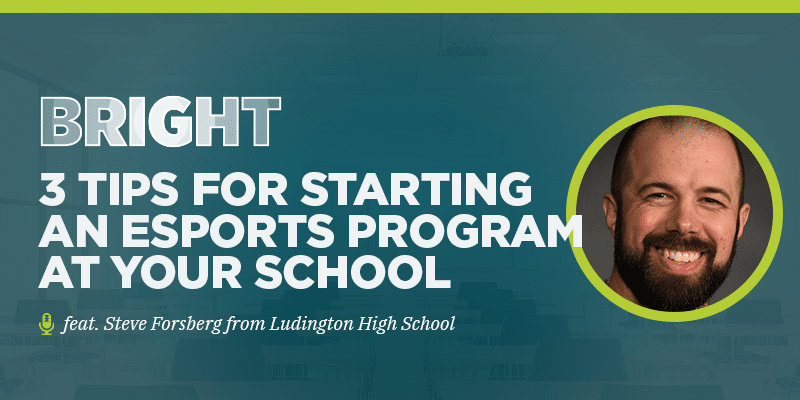Or listen on Apple, Spotify, Google, or another platform. Alternatively, you can read along with the transcript.
It’s no surprise that being involved with organized school activities often boosts students’ academic achievement, self-confidence, and mental health.
That’s part of what led Steve Forsberg — a self-described “traditional athletics person” — to launch an esports team at Ludington High School, where he’s the assistant principal.
If you’re unfamiliar, esports are video games played in a team-based, highly competitive setting. Popular games in the esports include:
- League of Legends
- Rocket League
- Super Smash Bros. Ultimate
- Madden NFL 22
- Splatoon 2
- Mario Kart 8 Deluxe
- Hearthstone
- Overwatch
But, according to Steve, esports is about much more than video games.
“Yes, it’s kids playing video games,” he explains, “but they’re playing it on a team in a competitive atmosphere. There’s communication, there’s coordination, there’s teamwork, and there’s accountability. It has all the aspects of traditional athletics and extracurriculars.”
Another argument for why esports is so beneficial:
Students are already playing these games at home.
Rather than having them isolated in their own homes — engaging in online communities infamous for their “toxicity” — school leaders have the opportunity to bring students together who might not otherwise engage in extracurriculars.
Besides, with esports as a billon-dollar industry and growing, students have opportunities to grow their career and leadership skills through school-sanctioned activities.
In this episode of the BRIGHT podcast, Steve shares:
- Some background information for those who aren’t very familiar with esports,
- Why these leagues are booming in popularity, and why they’re so beneficial for students, and
- His top three tips for starting an esports program at your school.
You can listen to my conversation with Steve using the audio player above or by subscribing to the BRIGHT podcast in your app-of-choice (find us on Apple, Spotify, Google, and more) or by reading along with the transcript.
Of course, we understand that educators are busier than ever. If you don’t have time to listen to Steve’s full episode (which offers the fuller effect of his wisdom, energy, and examples), you can still benefit from a glimpse at his top three tips below!
3 tips for starting an esports program at your school
#1. Rest assured: You don’t need esports knowledge to get started
According to Steve, you don’t need gaming knowledge to start an esports program at your school.
“There’s still stuff [the students] talk about that I don’t understand,” he admits, “and that’s okay. You just need to want to connect with kids, give them opportunities to have fun together, and create a culture.”
The students themselves are Steve’s biggest source of support. The captains of each team help coach their peers and make sure he “knows enough not to be dangerous.”
In fact, Steve says that learning new things daily is part of the fun of coaching an esports team.
“What attracted a lot of us to education in the first place is that we’re voracious learners,” he explains. “I’m very open and honest with the kids. I tell them, ‘I don’t know what’s going on, but I’m going to empower you.’”
So, take it from Steve, who’s been running a successful esports team for over a year now:
You don’t need to be a gaming expert to give your students opportunities to participate in esports.
#2. Empower students to help you build & grow your program
At first, Steve was a little overwhelmed by the number of students who expressed interest in esports.
Ludington High School has about 700 students, and approximately 50 said they’d be interested in participating. That’s certainly not an insignificant percentage of their student population.
Of course, not every single one of these students stuck around, but Steve estimates that they are still able to impact 40-50 kids throughout the year.
These students have been critical in helping Steve build and grow the program. They help with everything from fundraising and community events to jersey design and streaming online.
Player coaches have also been a critical part of the esports ecosystem at Ludington.
While Steve plays more of a director-level role, helping to organize, administrate, and build a strong team culture, his captains are the ones who know the ins and outs of their games and help coach their peers.
Steve’s advice?
“Don’t be afraid to reach out to a core group of kids that you think are interested and have them help you grow your program.”
#3. Connect with the Michigan High School Esports League
Steve has only praise to share about the Michigan High School Esports League (MHSEL), run by the Michigan Association of Secondary School Principals (MASSP).
This group’s guidance — and the resources available on their website — were critical to helping him get their esports program at Ludington launched and running.
Resources available through this group that Steve found invaluable included:
- Templates for parent letters
- Student interest surveys
- Information on the benefits of esports for students
“They’re phenomenal folks,” he says. “They’re just passionate about esports and getting kids involved in stuff. So if you have questions, needs, obstacles, concerns, reach out to them, and they will help you get it going.”
Steve also says he’s happy to talk with fellow school leaders, emphasizing that he’d be willing to answer questions or put school leaders in touch with local peers already running esports programs.
“We can walk through this together,” says Steve, “and grow this movement for kids.
My favorite quotes from this episode
“What hit a chord with me was that we already have students that are already playing these games, so why wouldn’t we bring them in, organize them, and have them do it together in a place where we can build some community and a positive culture around it?”
“We’re running athletic eligibility for everybody on my team. They have to keep their grades up if they want to be on the team and compete. There are some great academic benefits. When students are a part of something in a school, their academic achievement, self-confidence, and mental health improve. There are all these intrinsic and side benefits to being a part of something. That’s what really drew me to it.”
“We’ve got such an eclectic group of kids. For example, one of my captains is also an all-state tennis player. He’s the traditional athlete, but he’s also the captain of Rocket League. Then, I’ve got other kids that might never have chosen to be involved in anything else now organized with our high school and putting on the orange and black.”
Related resources
- Explore resources: Michigan High School Esports League (MHSEL)

